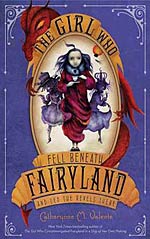
![]() FeminineFantastique
FeminineFantastique
5/23/2014
![]()
I never bothered to stop and review Catherynne Valente's The Girl Who Circumnavigated Fairyland in a Ship of Her Own Making, the first novel in this series that won the Locus YA Award, because I was too impatient to get to this, the second book in the series published in 2012.
The Girl Who Fell Beneath Fairyland and Led the Revels There manages to be even better than its predecessor.
In this book, September must venture into Fairyland-Below. For her shadow Halloween, which was stolen from her in the previous novel, has taken over Fairyland-Below as its queen and has been getting up to a lot of mischief.
This is a more grown-up book than the first novel; Halloween is an ambiguous antagonist. She is less of a villain like the Marquess and more the resultant adolescent of a child that had never once been told "no" before. Nonetheless, her actions are imposing disastrous consequences upon Fairyland, which is losing its magic. And so it is up to September to rise against her and undo the damage she has caused.
In Fairyland-Below, which is even wilder and more labyrinthine than Fairyland-Above, September makes new friends, meets a host of new marvelous creatures, and navigates a new series of fantastical landscapes, such as a forest made entirely of glass and the Forgetful Sea. She acquires a new cognizant coat, haggles skilfully in the Goblin Market, and has several other new adventures, which you'll have to read the book to discover.
Readers who would appreciate the Fairyland books the least are ones that demand that plots be entirely causal. (If there's a logic to Fairyland, I haven't figured it out yet.) But Valente's characters, worldbuilding, and writing are delightful. The narration is clever and witty, and the imagery evocative. I'd tried a few of her adult novels, and they were too postmodern for me, or maybe just too smart. But Fairyland reads like it was written by the love child of Lewis Carroll and Terry Pratchett, who also just happened to be schooled in literary surrealism.
And regardless of whether this was intentional on the part of the author, this book hit all the right feminist notes in my opinion. First, the series is a coming-of-age story — one in which the heroine doesn't just overcome obstacles and find her destiny, but also learns the more difficult truths about life — and while those aren't exactly rare in the fantasy genre, ones with female protagonists aren't common. Second, both the protagonist and antagonists are nuanced, dynamic characters and have motives, backstories, and personalities that ring true.
Third. How can you be a feminist and also a fan of the fantasy genre and not love a book with a passage like this?
"I don't want to be a princess," she said finally. "You can't make me be one." She knew very well what became of Princesses, as Princesses often get books written about them. Either terrible things happened to them, such as kidnappings and cursings and pricking fingers and getting poisoned and locked up in towers, or else they just waited around until the Prince finished the story and got around to marrying her. Either way, September wanted nothing to do with Princessing.
That passage, in fact, says why you should immediately check out this series far better than anything I possibly could.
http://manicpixiedreamworlds.wordpress.com/